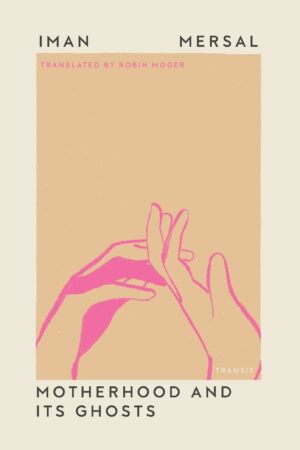Motherhood and Its Ghosts
by Iman Mersal
reviewed by Katy Dycus
In Motherhood and Its Ghosts, an essay collection that is part autobiography, part literary criticism, Iman Mersal, an Egyptian poet, translator, and literary scholar, is more concerned with listening to the voices outside the narrative of motherhood than those within. Rather than understanding motherhood as a “melding of two distinct selves, a love unlimited and unconditional,” Mersal sees it as an “existential struggle, a tug-of-war between one self and another,” entailing guilt, angst, and conflict. For all the advances of feminist discourse, Mersal argues, feminist theories have yet to fully consider the range of emotions inherent in motherhood, such as frustration or anger. To fill this gap, Mersal urges mothers to narrate their own experience, or “to take refuge in a narrative that will help you see that you are not alone.”
Motherhood and Its Ghosts, translated from the Arabic by Robin Moger, takes up this project of self-narrativizing. Through this achingly tender collection dealing with literary and cultural perceptions of motherhood, Mersal inserts fragments of herself in the form of journal entries. She narrates her own experiences, such as giving birth to her eldest son in Canada, where she had no familial support and few friends, and bonding with an Iranian doctor in group therapy sessions for postpartum depression—both of them in exile, far from their homelands and lacking frames of reference.
Mersal turns to poetry to understand motherhood and grief. In her essay “For and Against Institutions,” Mersal tells us that, as a small child, she lost what would have been her best frame of reference for motherhood: her own mother, who died at age twenty-seven, just hours after delivering a stillborn baby. She thinks through this personal tragedy by discussing Polish poet Anna Swir’s poem “Maternity,” in which a child’s arrival threatens the existence of her mother. “The moment of a new person’s birth requires the death of another,” Mersal writes, thinking of her own mother but also inviting metaphorical implications: the process of birthing a child as simultaneously joyous and mournful, a loss of an old life and old self. Mersal reads Syrian poet Saniya Saleh’s poem “Sham, Set Night Free” as one which represents “birth as a shared act in which the mother is born as her baby is born.”
Mersal’s thin volume sings elegiac, like one of her grandmother’s nighttime lamentations. There is one song Mersal remembers from childhood and sings to her sons: “Mama zamanha gaiya” (“Mama will be here soon”). When her sons demand an English lullaby, Mersal tries but fails; they tell her she’s singing it wrong, or that she makes it sound sad. Mersal thinks, “Mothers should sing their children the lullabies they were raised on. How can I claim as my own a song I never knew growing up?” It is a question that at once conflates motherhood, motherland, and mother tongue. But sing for them she does. On a nature retreat, her troubled son, Youssef, writes about one of the most beautiful moments of his life: “When Mama sits in the corridor between my bedroom and my brother’s singing ‘Twinkle, Twinkle, Little Star’ to the wrong beat.” In the epilogue, Mersal writes, “It is to understand Youssef, if only a little, that I write this book.”
Mersal’s need to understand her own mother matches the intensity with which she aims to discern her children. She claims that motherhood encourages bidirectional seeing: a mother looks to the future, when she becomes a mother to her child, but also to the past, when she was a daughter to a mother. As a daughter wanting to rescue her mother from obscurity, Mersal turns to the only visual evidence she possesses: a single photograph of the two of them taken just months before her mother’s death. Yet she doesn’t recognize this woman.
Mersal uses a photographic archive to move from the personal to a wider exploration of motherhood. She starts with the nineteenth-century practice of “hidden mother photography,” in which mothers concealed themselves with fabric so they could appear invisible before the camera, making their child the focus of the image. For Mersal, the image of the hidden mother symbolizes both sacrifice and the threat of erasure. From these hidden mothers, Mersal shifts to photographs where motherhood is made visible on a large scale and stands in for “an entire moment in history: social strife, a disaster, a nation”: a Palestinian mother standing amid a crowd of children and Israeli soldiers, a Ukrainian mother carrying her baby, on foot, to the border of an eastern European country upon Russia’s invasion of Ukraine.
Motherhood and Its Ghosts holds a candle to the uncertainties and paradoxes inherent in motherhood and in life. Tragedy yields triumph; strength is determined by loss; joy exists alongside mourning; life and death intersect. “But why do we die, Mama?” Mersal’s son asks her. “Habibi, maybe it’s because we … I mean … Maybe because we’re greater than life.”
Published on October 14, 2025

